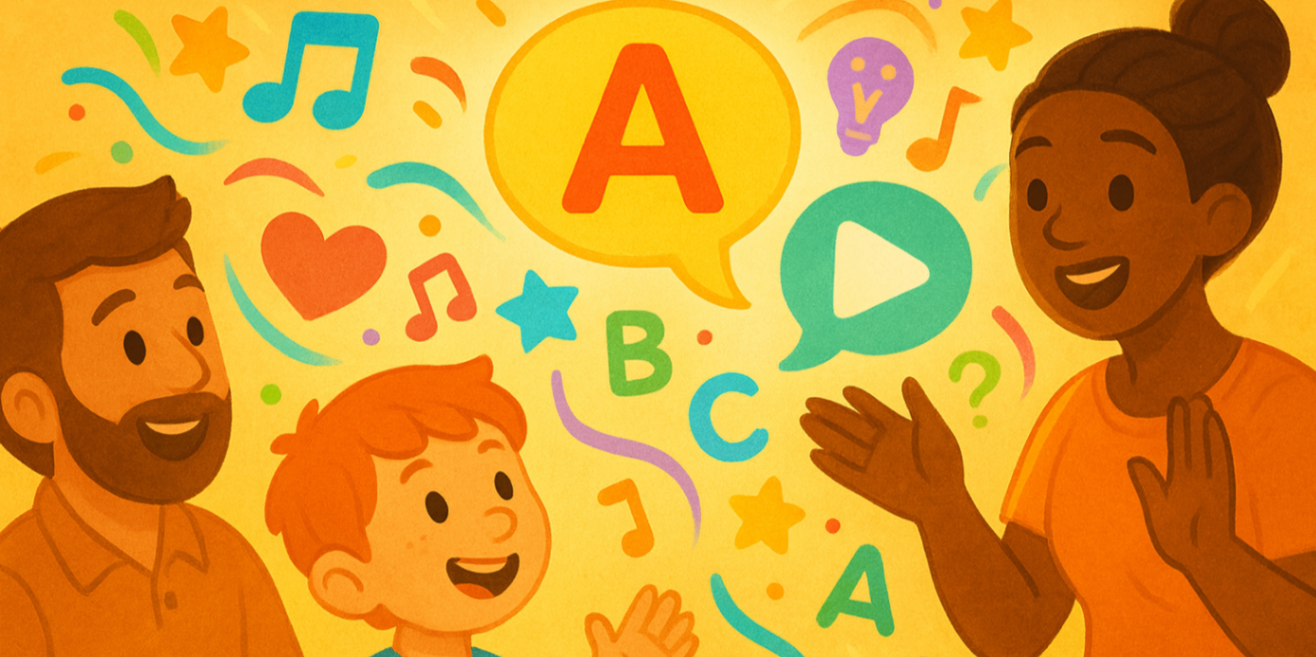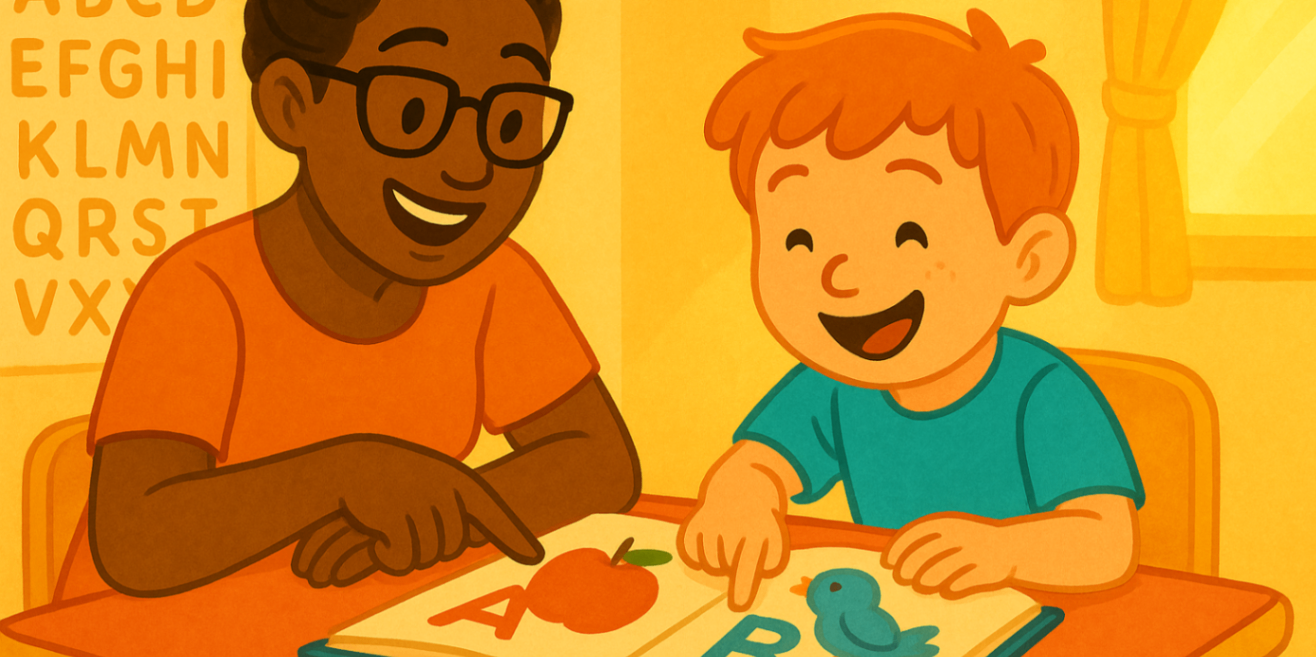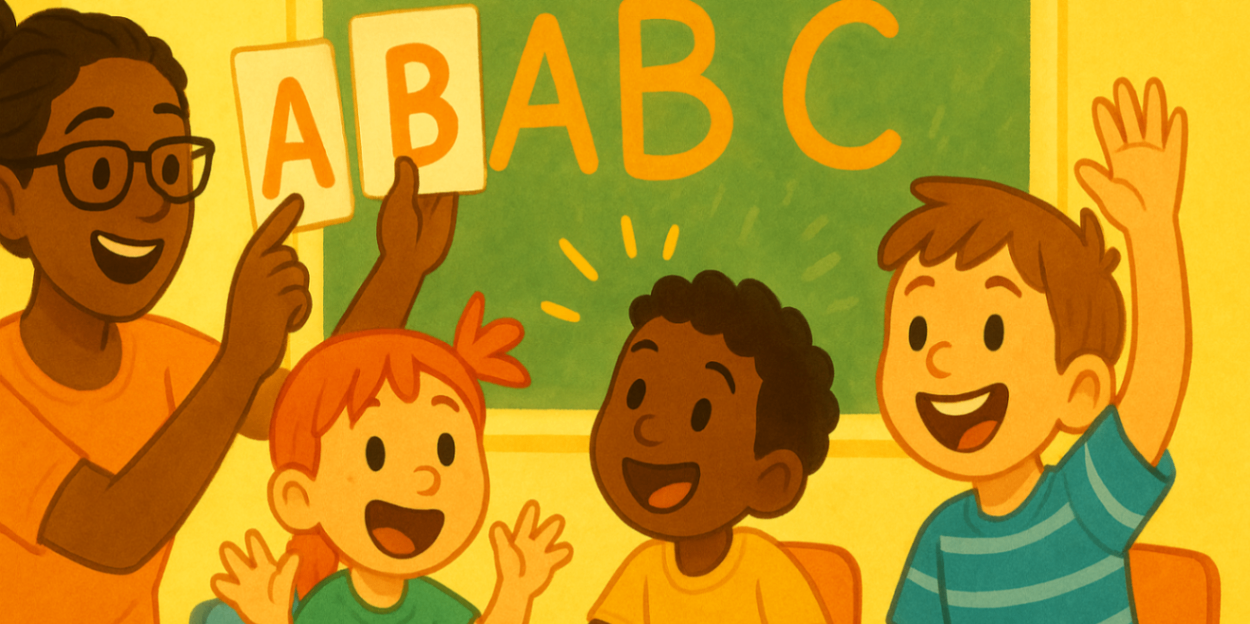
how speech therapy supports literacy skills in children
11 September, 2025
Speech therapy helps kids hear sounds and use them the right way. This is known as phonological awareness. With speech therapy, the child will also learn new words and build up their vocabulary. They get better at putting ideas in order when they write. All these things mean speech therapy is a good type of early intervention. It can help children read and write better as they grow.
Speech therapy is a way to help people read and write better. When someone says speech therapy literacy skills, they mean learning the simple parts of language. These basics are the sounds in words, the words that kids know or learn, how sentences come together, and how to tell a story. All of these are needed for reading and writing to work well. A child can need speech therapy for reading, or they can need help to grow strong speech therapy writing skills. A speech pathologist who works with literacy skills can teach kids in a new way. This can help kids feel better and more sure about reading and writing.
Key Highlights
Here are the key takeaways from our discussion:
-
Speech therapy helps kids get language skills they need for reading and writing. These language skills be known as speech therapy literacy skills.
-
A child with good oral language skills, strong vocabulary, phonological awareness, sentence structure, and the skill to tell stories often do well with reading and writing.
-
When kids have early speech therapy and language help, small problems be less likely to turn into bigger learning issues later.
-
Speech-language pathologists use proven ways to help kids with phonological awareness, reading words, text understanding, and writing skills.
-
Therapy can make vocabulary, sentence structure, and expressive language better. All these matter for writing at school.
-
A team of therapists, teachers, and parents can give kids strong support. They work together by using speech therapy and language goals in both classroom and home life.
What Is the Link Between Speech Therapy and Literacy?

The link between speech therapy and learning to read is strong. A child needs to hear sounds and play with them before they read words with ease. It is important for a child to have a good vocabulary to understand text. They also need to use grammar to make sentences. A speech-language pathologist looks at each person and checks which parts of speaking need help. They then give help based on those needs.
When kids do speech therapy for reading, they learn about speech sounds. This help makes the basic skills better. It gives kids what they need to read and write well. Kids can read and write in ways that feel good and have meaning for them. Phonological awareness is key here, and it helps a lot in learning to read.
Children who have Speech Sound Disorders (SSD), a delay in language, or trouble with how they use sounds, can have a hard time when they try to read and write. The ways the brain works to talk and read are the same in many ways. If these problems are found early and kids get the best therapy that focuses on these problems, they can read and write better as they get older.
How Speech Therapy Improves Reading Skills
Are you wondering how speech therapy supports reading skills? The way it works is simple. Speech therapy helps children with the basics they need to read. A big part of this is phonological awareness. When children do speech therapy, they practice hearing and using sounds in words. This practice helps them feel more sure about reading. Working on phonological awareness gives children the skills they need to read well as they keep learning. Speech therapy supports them by teaching the steps they need for reading.
This way of teaching helps kids get a strong foundation in reading. When therapy gives children the chance to Improve their language skills, it gets them to read with more ease. Better language skills can help with homework and classwork. It also Improve their academic performance and makes them feel more sure of themselves.
Supporting Writing and Vocabulary Through Therapy
Speech therapy can help kids improve their writing skills. It also helps them learn new words. When kids join therapy sessions, they hear new words and practice using them. This helps them understand these words, and use language in better ways. So, speech therapy supports kids to use speech and writing well.
When kids learn more words, they can talk about what they feel and think in a clear way. This helps build their expressive language. With a bigger vocabulary, their writing abilities get better too. They move from short and simple sentences to text that has more details. This also helps them describe things in a better way.
Kids feel better about writing when they have better vocabulary and language skills. Good language development from speech therapy gives your child tools to put their thoughts in order. A child learns to make sentences that are easy to read and right. They practice putting their ideas on paper. By working on expressive language in speech therapy, your child can really grow and do better.
Early Intervention: Why Timing Matters in Literacy Development
 When it comes to literacy development, timing matters a lot. If you do early intervention in early childhood, it can help children who have language difficulties or trouble with speaking. Using speech therapy at this time gives them a way to build good foundational skills. The brain is most ready to learn language skills during early childhood. Taking steps early like this can keep bigger problems with learning from showing up later.
When it comes to literacy development, timing matters a lot. If you do early intervention in early childhood, it can help children who have language difficulties or trouble with speaking. Using speech therapy at this time gives them a way to build good foundational skills. The brain is most ready to learn language skills during early childhood. Taking steps early like this can keep bigger problems with learning from showing up later.
Acting early helps children feel less frustration with reading and writing. It can help them feel more confident, too. Children that have language impairments often face more literacy challenges. But when these children get help early, it can change things for them in a good way. The American Speech-Language-Hearing Association says SLPs work to stop written language problems. They help by building up language skills and emergent literacy. If you get targeted therapy early, you give your child better tools to use. Your child can have better academic performance and feel good about learning.
Signs a Child May Benefit from Speech Therapy
It can be hard to know if your child needs help. But look out for some signs that show speech therapy can be good for their literacy skills. If you see these signs early, you can do what is right and help your child grow.
Look out for these common signs:
-
A child may not say some parts of a word the right way.
-
A child may get lost when you give them steps to follow or when you ask a question.
-
A child may not know as many words as other kids who are their age.
-
A child may find reading hard, like saying each part of a word.
-
A child may not be good at writing. This can show in grammar or in the way they put words together in a sentence structure.
If you notice any of these in your child, it may mean they have language delays. The child may have trouble with reading, writing, or both. A child with language delays might find it hard to understand the words that others say. They could also have difficulty sharing what they feel with words. These issues can make reading and writing feel a lot harder for a child. A speech-language pathologist will look at your child's needs and decide if therapy would be good for them.
The Role of Speech Pathologists in School Success
Speech-language pathologists, who are also called SLPs, help your child do well in school. They do more than help with how kids talk. SLPs work with students to build good communication skills. These skills are key for learning, talking with others, and showing what they know. With support from the SLP, kids find it easier to keep up in class and take part in lessons. Strong communication skills can lead to better academic success.
For kids who have language impairments, it is important to get help from speech pathologists. The SLPs make plans to help every child with their reading and writing. They work on language skills and are there to help kids feel good and do better in school. This support brings language skills and reading needs together. It uses ways that fit each child. All of this is made to make their foundational skills and literacy outcomes better.
Integrating Language and Literacy Goals in Therapy Sessions
Now in speech therapy, most experts see language skills and literacy goals as working together. A speech-language pathologist uses both in therapy sessions. The spoken and written parts of language are linked. Each one can help the other get better.
For example, a therapist may read a storybook with a child. The child can practice speech sounds while they read. The child can also answer questions about the story. This helps them understand what is read. Doing both can make learning easier and feel like part of everyday life.
Every child is unique, so the therapy sessions are set up to suit their individual needs. A child might have language delays or problems with talking. The SLP will shape the therapy sessions to improve their language abilities. At the same time, the SLP helps them work towards their literacy goals. These sessions are meant to support the child and keep things fun for them.
Tailored Strategies for Children with Literacy Difficulties
One plan does not work for every child, especially for those with literacy difficulties. That is why speech-language pathologists look at the individual needs of each child before starting. They first check your child’s skills and see what the critical areas are that need help. Then, they use strong intervention strategies that have been tested to help your child improve.
This way of teaching often uses explicit instruction. A child gets shown what to do in a clear and easy-to-follow way. The steps be simple and in order, one after the other. This helps the child get one idea before moving to the next. These methods are made to work well and keep kids paying attention. They help children feel sure and ready about what they learn.
People handle some literacy difficulties in lots of ways. They find strategies that fit each person. The strategies be made to work with what people need most.
|
Literacy Difficulty |
Speech Therapy Intervention Strategy |
|---|---|
|
Poor Phonological Awareness |
Engaging in sound games that involve blending sounds to make words or segmenting words into individual sounds. |
|
Limited Vocabulary |
Using storybooks and themed activities to introduce and reinforce new words in a meaningful context. |
|
Weak Reading Comprehension |
Teaching the child to use graphic organisers or story maps to visualise and understand characters, setting, and plot. |
|
Difficulty with Spelling |
Focusing on phoneme-grapheme correspondence to build understanding of how sounds relate to letters. |
Collaborative Approaches for Literacy Development

The best way to help with a child's literacy development is for everyone to join in. If speech therapists, teachers, and parents work as a team, the child will get strong support. This holistic approach shows that the team shares the same goals and wants the best results.
When speech therapists and teachers talk to each other, they help make sure that what kids learn in therapy matches what they learn at school. This keeps things the same for the child. The child will practice the same things in different places. So, the skills can be used everywhere. A team working like this helps build a strong foundation for good reading and writing that can last a long time.
Evidence-Based Strategies in Speech Therapy
Speech therapy is not about guessing. It is based on science. A speech-language pathologist uses ways that are tested by research. These help when a child has language difficulties. This means your child can get the best care for their needs in speech therapy.
These tried-and-true ways are chosen to fix the biggest issues people face with literacy skills. Plans that use real data help therapists make a sure and clear change in how a child reads, writes, and talks. With this help, children get a better shot at doing well for a long time and feel a positive impact too.
Activities That Build Literacy Skills
Therapy sessions often include fun and interesting literacy activities. These feel more like play than work, but they are made to help people build reading skills. Every activity in these therapy sessions is chosen to help a certain area of literacy development. Some will focus on early skills, like emergent literacy, while others are there to help with reading comprehension.
Here are some things that a therapist can do:
-
Shared Reading: Sit down with your child and read a book together. Talk about the story, the people in the book, and the pictures you see. This can help them learn more words and understand what is going on in the book.
-
Sound Games: Play games where you clap for each part a word has or listen for the first sound in a word. This is good for phonemic awareness and helps your child get better at hearing parts of words.
-
Storytelling: Encourage your child to tell a story they know, or make up a new one. This gives them practice with putting sentences together and using the right sentence structure.
-
Rhyming and Alliteration: Use songs and poems that have rhyming words or words that start with the same sound. This can help your child hear the different patterns and sounds we use in our language.
These fun things are not only to keep kids busy. The activities help children build communication skills. Kids need these skills to read and write. When learning is fun, they feel happy to join in. Therapists also help kids stay interested. This way, they get a stronger foundation for reading and writing that helps them through their lives.
Conclusion
Speech therapy helps children build the language skills they need to read and write. A speech-language pathologist teaches phonological awareness, vocabulary, sentence structure, and story-telling. This helps the child make progress in speech therapy literacy skills, speech therapy for reading, and speech therapy writing skills.
It is good to do assessments early. A team of teachers and parents working together gives the best results. If you feel worried about your child's development in literacy skills, a speech therapy plan can help. Reach out to get started.
Ready to start? Book consultation now with a qualified speech pathologist.
Frequently Asked Questions
Can speech therapy help children struggling with both reading and writing?
Yes, speech therapy can help children who find reading and writing hard. It gives them support to build their language skills. This helps kids read and write better. The person who helps your child will use different intervention strategies. These steps help the child improve their vocabulary, learn the right grammar, and build phonological awareness. All of these are the skills children use when they read and write. They are important for kids to do well in every part of literacy.
What age is ideal to begin speech therapy for literacy support?
It is best to begin in early childhood. If you notice signs of speech delays or language difficulties, you should act right away. Early intervention helps give your child a solid foundation for learning. It lets them keep up with others and gets them ready for academic success. Starting early gives them the best chance to do well at school.
How do speech therapists collaborate with teachers to support a child’s literacy?
Speech therapists and teachers work as a team. They talk about what they see. They set the same targets for the child. They use steady ways to help with learning. This holistic approach helps with the child's literacy development. It works during therapy sessions and also at school. The child gets a strong plan for learning. This supports academic success and helps them improve in all places.
.svg)

















